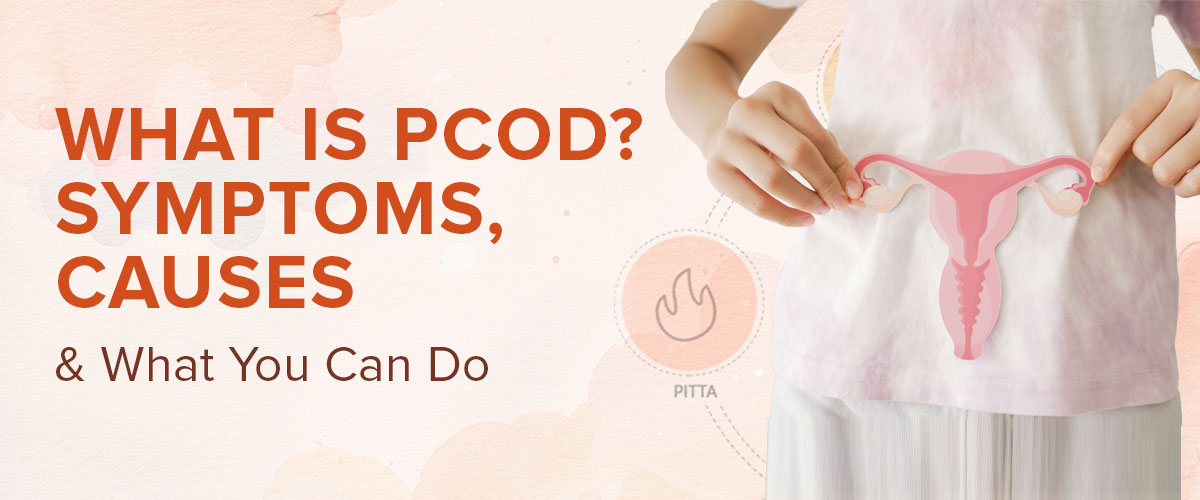Polycystic Ovary Disease or PCOD is a medical condition that impacts many women in India. Recent studies show that 1 in 5 young women in India suffer from this particular condition, and that is much more compared to the world average of 8 to 13%. This means that in a room with 5 young females, one will have PCOD.
If you have PCOD, you might experience irregular periods, pregnancy issues and changes in appearance including increased growth of hair or pimples. It can also raise your likelihood of getting chronic diseases including diabetes and heart problems. Given its effect on physical and emotional health, understanding the causes and symptoms of PCOD becomes important.
In India, Ayurveda is increasingly being used for PCOD management. Many women are seeking relief from PCOD symptoms without conventional treatments by using these holistic approaches.
Let us learn more about PCOD and what are the available options including Ayurvedic methods for managing this condition.
What Is PCOD?
PCOD (Polycystic Ovarian Disease) is a globally-prevalent disease that also affects millions of women in India. But many people confuse PCOD with a similarly sounding health problem, Polycystic Ovary Syndrome (PCOS).
PCOD is characterised by creation of multiple immature or partly mature eggs which ultimately produce cysts within your ovary. It's usually related to hormonal imbalances, although your ovaries commonly continue to operate and might still release eggs. What this means is that PCOD females might suffer from irregular menstruations but aren't always infertile.
PCOS (Polycystic Ovary Syndrome) is much more serious and has similar symptoms as PCOD but is primarily a metabolic disorder. Women with PCOS experience worse symptoms including anovulation (no ovulation occurs) and even infertility.
Let us understand the difference between PCOD vs. PCOS:
| Aspect | PCOD | PCOS |
|
Prevalence |
Common, affects many women |
Less common but more severe |
|
Symptoms |
Weight gain, irregular periods, hair growth |
Weight gain, infertility, severe acne, hair growth |
|
Fertility |
Fertility is generally not compromised |
High risk of infertility |
|
Hormonal Impact |
Mild hormonal imbalance |
Severe hormonal imbalance |
|
Management |
Lifestyle changes, diet |
Medication, lifestyle changes, possibly surgery |
Pro Tip: You should consult your Ayurvedic doctor regularly. Early diagnosis can help with better and timely management of PCOD symptoms.
What Are the Symptoms of PCOD?
If you have PCOD, recognising the symptoms is your first step towards controlling the condition. If you have been feeling a bit off and can’t determine why, it may be time to see if you have symptoms of PCOD. Here are some of these symptoms to look out for :
Irregular Menstruation: The most common sign of PCOD is irregular menstrual cycles. You might have irregular periods and the time between periods may also vary considerably. This is because PCOD impacts how your ovaries release eggs.
Weight Gain: Some PCOD women report unexplained weight gain around the waist. This may be frustrating if you don't change your eating or exercise routines.
Excessive Hair Growth: Medically called hirsutism, the symptom involves hair growth where usually males have hair, like on the facial skin, back, and chest area. It results from hormonal imbalances in PCOD, mainly from a rise of androgens (male hormones).
Thinning of Hair on the Scalp: On one hand, you might see more hair growing where you don't need it, and on the other hand, the hair on your head could thin out. Sometimes this happens in a pattern which resembles male baldness.
Acne or Oily Skin: You may also see changes in your skin appearance (particularly chronic acne or unusually oily skin). This is also a noticeable symptom of PCOD.
Fatigue: Another common complaint of PCOD women is feeling unusually exhausted despite getting adequate sleep.
If you see any of these symptoms, then make sure you discuss it with your Ayurvedic doctor. Early intervention could help manage these symptoms and improve your health.
What Causes PCOD?
It can be difficult to understand what really causes PCOD as the precise causes differ for every person. But even then, many factors are related to its development. Let us now understand these factors so you can take the next step in addressing your condition.
Genetic Factors: There is proof that your genetics contribute to PCOD. In case your mother, sister or uncle has PCOD, you also might develop it. This familial trend implies that some genetic characteristics raise the risk of PCOD.
Hormonal Imbalances: Hormonal imbalances, which include elevated androgens (male hormones which all females produce) and insulin are also common reasons for PCOD. These imbalances could hinder ovulation and lead to symptoms including irregular periods and pimples.
Insulin Resistance: Many women with PCOD have insulin resistance. This increases insulin and may increase androgen production and worsen your PCOD symptoms further.
Inflammation: Inflammation levels in females with PCOD are generally higher. Your androgen levels could increase due to chronic inflammation, which might intensify PCOD symptoms.
As you understand these causes of PCOD, you can manage your condition and minimise the effect of PCOD in your daily life. After all, these small steps can make a huge difference in our lives.
How Can You Naturally Handle PCOD Symptoms?
If you wish to naturally manage your PCOD, you have to make certain lifestyle and dietary modifications to maintain hormonal balance and health. This is how you can take control and potentially ease your symptoms:
Lifestyle Changes:
Remain Active: Regular physical activity is very important for your body. It helps with weight management and insulin resistance which is common in PCOD. And remember, you don’t need to run marathons. Even walking, yoga or any simple kind of exercise can make a difference.
Manage Stress: Hormonal imbalances can worsen if you have persistent stress. Techniques like meditation, deep breathing or hobbies can bring down stress and improve hormonal health.
Consistent Sleep Pattern: Sleep deprivation disturbs your hormonal balance. Take 7-9 hours of quality sleep each night to balance your cycle and upgrade your health.
Dietary Tips:
Choose Whole Foods: Consume fruits & vegetables, whole grains and protein rich foods. These foods are nutritious and help to stabilise your insulin and blood sugar.
Limit Processed Foods & Sugars: Sugary diets might worsen your body’s insulin resistance. Restrict sugary snack foods, drinks, and refined carbs.
Include Healthy Fats: Foods loaded with omega 3 essential fatty acids ( like for ex - flaxseeds and walnuts) can help reduce PCOD inflammatory reaction.
Natural Remedies Pro Tips:
Cinnamon: Cinnamon could ease PCOD symptoms by reducing insulin sensitivity. Include it with yogurt or oatmeal, or blend into smoothies.
Spearmint Tea: Drinking spearmint tea two times daily can lower androgen levels, reduce hirsutism (excessive hair growth) and also alleviate additional PCOD symptoms.
Apple Cider Vinegar: This simple ingredient can enhance your insulin sensitivity. Try putting one tablespoon in a cup of water and drink it before meals.
You can manage your PCOD by adopting these natural strategies and dietary changes. Remember, making little changes steadily can improve how you feel and manage your symptoms. Always consult an Ayurvedic medical professional before beginning any new plan for PCOD treatment.
How Can Ayurveda Help With PCOD?
Ayurveda offers age-old insights & remedies for PCOD by restoring balance in your body & improving health through natural herbs, diet & lifestyle changes. This is how Ayurvedic herbs could help you manage PCOD:
1. Shatavari (Asparagus Racemosus)
Shatavari is known to improve women’s reproductive health in Ayurveda. It is especially useful for feeding and toning the reproductive organs and for balancing the hormone levels needed for PCOD management.
Pro Tip: Mix Shatavari powder with warm milk and drink every day. Take it into your morning routine so that it can become a part of your daily life. But watch how your body reacts to Shatavari. If it’s too strong, you need to make dosage adjustments.
2. Triphala
Triphala is a blend of 3 fruits (Amalaki, Bibhitaki and Haritaki) which is full of antioxidants. It detoxifies the body and improves digestion, one of the basic issues with PCOD.
Pro Tip: Take Triphala churna (powder) with warm water at bedtime for detoxification and improving metabolism overnight. Keep this routine consistent to see results. Triphala is mild but potent, so always remember to begin with small doses.
3. Guduchi (Tinospora Cordifolia)
Guduchi is an adaptogen and anti-inflammatory herb that can help reduce insulin resistance and PCOD-related inflammation.
Pro Tip: Guduchi may be taken as a decoction or a powder. If you are new to Guduchi, you should start with a small dose to see how your body reacts, particularly in case you are on other medications.
4. Cinnamon
Cinnamon is utilised in Ayurvedic methods as an insulin-sensitiser. It can help manage the insulin resistance related to PCOD.
Pro Tip: Sprinkle cinnamon on breakfast cereals, in cooking or on your coffee or tea. This not only adds flavour but also helps to control blood sugar.
5. Aloe Vera
Aloe Vera cools and detoxifies the body and improves the health of reproductive organs, making it an excellent PCOD remedy.
Pro Tip: Make a drink using pure Aloe Vera gel with a bit of turmeric and consume it every day. This mixture can improve detoxification capacity of the liver and thus impact hormonal regulation directly.
6. Ashwagandha (Withania Somnifera)
Ashwagandha is an adaptogenic herb which helps your body balance hormones and decrease stress. This is essential for PCOD as it improves vitality and helps manage insulin levels.
Pro Tip: Include Ashwagandha powder in your nighttime routine by blending it with warm milk or water just before going to bed. This can improve sleep quality and support hormonal balance. Start small and test it out in case you're sensitive to herbal supplements.
7. Kanchanar Guggulu
Kanchanar Guggulu is an Ayurvedic formula used for the treatment of endocrine disorders. It's especially useful for managing conditions such as PCOD by regulating your hormonal levels and dissolving ovarian cysts.
Pro Tip: Kanchanar Guggulu must be taken under the guidance of an Ayurvedic practitioner as its formulation and dosage is unique to you. You can improve its effects with regular yoga to boost your strength and hormonal balance.
8. Fennel Seeds
Fennel seeds have outstanding phytoestrogenic qualities and may be utilised to manage PCOD symptoms including menstrual irregularities and hirsutism.
Pro Tip: Add fennel seeds to your meals or you can also consume fennel seed tea daily. This can help manage PCOD symptoms and improve digestion which is a major problem in people with PCOD.
Pro Tips for Integrating These Remedies
Including these Ayurvedic remedies to your daily routine can provide an excellent base for PCOD control. This is what to remember when adding these remedies to your life:
Begin Slowly: Introduce one remedy at a time to find out how your system reacts to each supplement.
Be Consistent: Regular and constant use is essential for seeing benefits, so don’t just include these remedies in your routine but make sure you follow them daily.
If you are coping with PCOD, these traditional herbs and remedies can help you regain your body's natural sense of balance and improve your well being.
What Can You Do Today to Begin Managing Your PCOD?
If you want to control your PCOD symptoms, it is not necessary to make massive changes. In reality, small, manageable changes in your day-to-day routine can change how you feel. These are some steps you can take today to manage your PCOD:
1. Adjust Your Diet
Start by evaluating everything you eat daily. Aim for a healthy diet for PCOD filled with whole foods - vegetables, fruits, lean proteins and whole grains. Reduce your intake of processed foods and sugars to stabilise your insulin and relieve PCOD symptoms.
Pro Tip: Start the morning with a high protein breakfast to stabilise blood glucose. Switch out sugary snacks for yogurt or nuts.
2. Add Regular Exercise
Exercise is a great tool for managing PCOD. It helps with weight management & insulin resistance. This does not mean that you have to do intensive workouts; even daily 30 minute walks or yoga can help.
Pro Tip: Schedule your exercise like an important appointment. Planning ahead helps you keep on course with your goals. Better yet, get a workout friend to keep one another going.
3. Monitor your Menstrual Cycle
Tracking Your menstrual cycle can tell you much about your reproductive health and any necessary PCOD patterns or modifications.
Pro Tip: Make this a simple task by using a menstrual cycle tracking app. This could also be a tool to share with your Ayurvedic doctor.
4. Handle Stress
As we have already discussed, chronic stress can worsen PCOD symptoms by impacting your hormones. Activities like meditating, deep breathing or even reading a book can help release stress.
Pro Tip: Try brief, guided meditation sessions with apps on your cell phone. They are a great place to begin when you are new to meditation and a good way to conclude your day.
5. Drink Plenty of Water
One thing that most of us forget in our busy lives is the importance of drinking adequate water. This affects your overall health as well as your PCOD symptoms. Water detoxifies the body and supports a proper metabolic rate.
Pro Tip: Carry a water bottle around to remind yourself to drink water during the day. Try flavouring your water with fruits like lemon or berries.
Final Thoughts
As we wrap up our discussion on understanding and managing PCOD, it is important for you to know that you aren't alone. Many women are dealing with similar challenges and with the proper information and the right strategy, you can significantly upgrade your quality of life. Start by making these changes today, be it your diet, some extra movement in your day time or simply taking some time to de-stress and relax.
Take it one step at a time and remember that each small change contributes to a larger impact on your health.
Reach out to our expert Jiva doctors for more information—just dial 0129-4264323.
FAQs
How to control my PCOD symptoms?
To manage your PCOD symptoms, you must eat right, exercise regularly and maintain a healthy weight. Stress management and getting enough sleep can also help balance your hormones.
Could a PCOD girl become pregnant?
Yes, a girl with PCOD can get pregnant. Managing your symptoms and consulting with an Ayurvedic professional could improve your chances of conception.
Which hormone is responsible for PCOD?
Androgens are the primary hormones responsible for PCOD and are generally seen to be elevated in PCOD females. This can cause excessive growth of hair and irregular periods.
What happens if a girl has PCOD?
A girl with PCOD might have irregular menstrual cycles, excess weight, acne and excess growth of hair. It can also raise the risk for other health conditions including diabetes.
How to avoid PCOD?
PCOD can be prevented by carrying out a proper diet regimen, consistent exercise and stress reduction. Early detection and management could also prevent complications.
Can PCOD be cured at home?
PCOD symptoms can be managed at home with lifestyle modifications including exercise and diet. It is also suggested to consult an Ayurvedic healthcare professional for advice.
What is generally called a PCOS belly?
A "PCOS belly" is usually excess weight around the waistline - a typical indicator of PCOS as a result of hormonal imbalances and insulin resistance.
What is the difference between PCOS & PCOD?
PCOS is a metabolic condition characterised by serious problems including infertility and anovulation whereas PCOD is milder and involves immature or partly mature eggs created by the ovaries.
What is the best Ayurvedic medicine for PCOD?
Shatavari is considered to be the best Ayurvedic remedy for PCOD as it helps to balance the hormones and improves fertility.























































